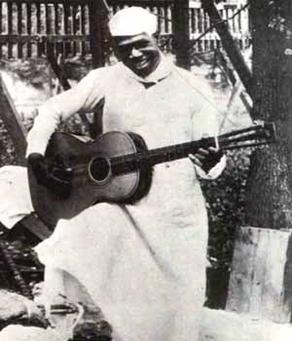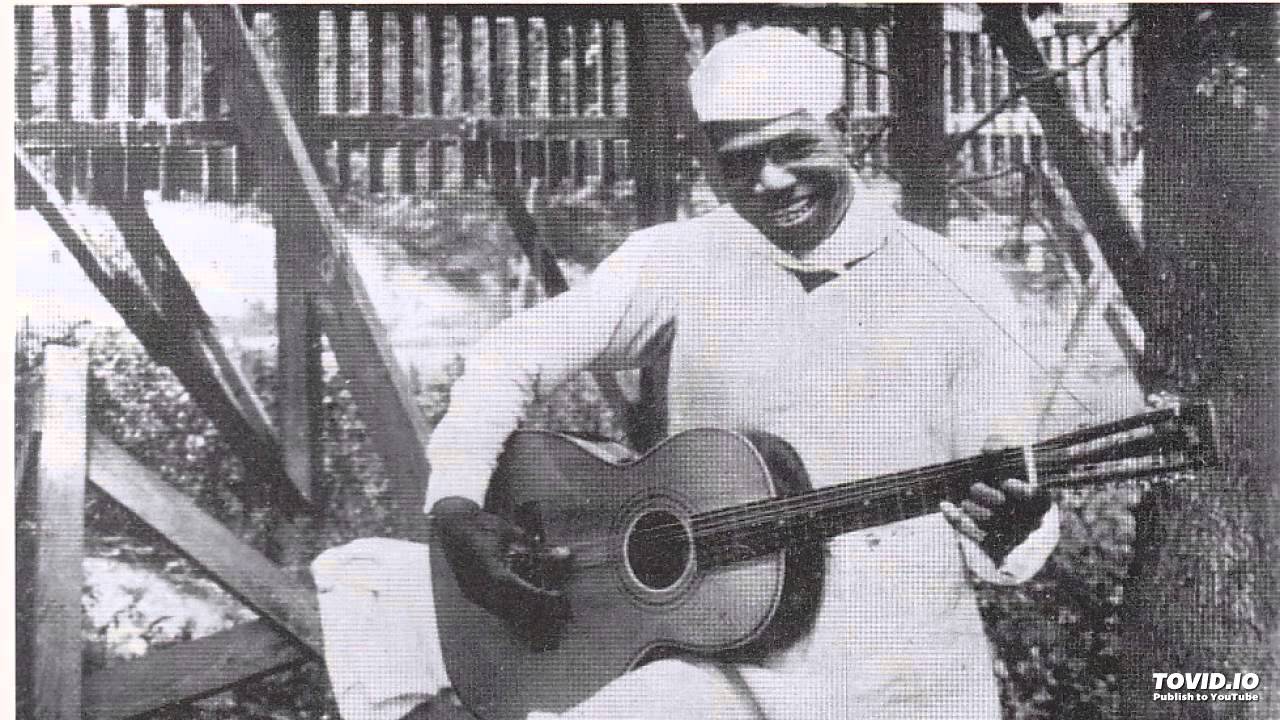Biography of Barbecue Bob
Introduction
Robert Hicks (September 11, 1902 – October 21, 1931), better known as Barbecue Bob, was an influential American Piedmont blues musician. He was noted for his unique 12-string guitar playing style, which was popular in the Atlanta, Georgia, area at the time. His nickname, “Barbecue Bob,” was given to him by a record label talent scout due to his work as a cook in a barbecue restaurant. One of the two existing photographs of him shows him playing his guitar and wearing a full-length white apron and a cook’s hat.

Childhood and Youth
Hicks was born in Walnut Grove, Georgia. His parents, Charlie and Mary Hicks, were sharecroppers. The family moved to Newton County, where his friend Curley Weaver’s mother, Savannah “Dip” Weaver, taught Bob and his brother, Charley Lincoln, how to play the guitar. Initially, Hicks played the six-string guitar but adopted the 12-string guitar after moving to Atlanta in 1924. He quickly became one of the prominent performers of the newly developing Atlanta blues style, which was characterized by the use of the 12-string guitar.
In Atlanta, Hicks worked various jobs, playing music on the side. While working at Tidwells’ Barbecue in an affluent Atlanta suburb, he cooked for and sang to customers, becoming a local celebrity. This is how he caught the attention of Dan Hornsby, a talent scout for Columbia Records, who recorded him and dubbed him “Barbecue Bob,” using his job to promote his records and having him pose in chef’s whites for publicity photos.
Adulthood and Career
Between March 1927 and December 1930, Hicks recorded 68 songs for Columbia Records, becoming one of the best-selling artists in their “race records” series, surpassed only by Bessie Smith, Ethel Waters, and Blind Willie Johnson. His first song, “Barbecue Blues,” was his first hit, quickly selling 15,000 copies. At his second recording session in New York City in June 1927, he recorded “Mississippi Heavy Water Blues,” a song inspired by the Great Mississippi Flood of 1927, which firmly established him in the “race records” market. This and his other blues recordings were popular and sold better than those of other Atlanta blues musicians.
With his brother, Charley Lincoln, he recorded “It Won’t Be Long Now,” a duet with crosstalk, in Atlanta on November 5, 1927. In April of the following year, Hicks recorded “Mississippi Low Levee Blues,” a sequel to “Mississippi Heavy Water Blues,” as well as two songs with a singer he had known since childhood, Nellie Florence: “Midnight Weeping Blues” and “Jacksonville Blues.” In April 1930, he recorded “We Sure Got Hard Times Now,” which contains bleak references to the Great Depression. As was common with other blues singers, he recorded a few traditional songs and spirituals, including “When the Saints Go Marching In,” “Poor Boy, Long Ways from Home,” and “Jesus’ Blood Can Make Me Whole.”
Hicks also recorded as a member of the Georgia Cotton Pickers in December 1930, a group consisting of Hicks, guitarist Curley Weaver, and harmonica player Buddy Moss. They recorded a handful of songs, including their adaptation of Blind Blake’s “Diddie Wa Diddie,” recorded as “Diddle-Da-Diddle,” and the Mississippi Sheiks’ “Sitting on Top of the World,” recorded as “I’m on My Way Down Home.” These were his last recordings.
Death
Hicks passed away in Lithonia, Georgia, on October 21, 1931, at the age of 29, due to a combination of tuberculosis and pneumonia, brought on by influenza. His recording of “Mississippi Heavy Water Blues” was played at his graveside before he was buried.
Musical Style and Influence
Hicks developed a guitar playing style known as “frailing,” more often associated with the traditional “clawhammer” banjo. He regularly used a bottleneck on his twelve-string guitar, playing in an open Spanish tuning (open G or open A tuning), reminiscent of Charley Patton’s style. His voice was strong, and he embellished it with growls and falsettos.
Although Hicks had some influence on Atlanta blues musicians, such as the young Buddy Moss, his playing style was quickly overshadowed by the finger-picked Piedmont blues style, which gained popularity in the late 1920s and early 1930s. Nevertheless, his music continues to be recognized. Eric Clapton, for example, played and recorded Hicks’s version of “Motherless Child Blues.” John Fahey also attributed his arrangement of “Poor Boy a Long Ways from Home” to Hicks in his 1979 tablature book.
Major Compositions
Throughout his brief but impactful career, Barbecue Bob recorded several compositions that became milestones in blues music. Among his most notable works are:
•”Barbecue Blues” (1927): His first and one of his biggest hits, which sold 15,000 copies and established him as a prominent artist.
•”Mississippi Heavy Water Blues” (1927): A song inspired by the Great Mississippi Flood of 1927, which solidified his position in the “race records” market.
•”Mississippi Low Levee Blues” (1928): A sequel to “Mississippi Heavy Water Blues,” demonstrating his ability to create musical narratives.
•”We Sure Got Hard Times Now” (1930): A somber reflection on the challenges of the Great Depression, showcasing his ability to address social themes in his lyrics.
•”Motherless Child Blues”: A song that, years later, would be interpreted and recorded by artists like Eric Clapton, highlighting Bob’s lasting influence.
In addition to his original compositions, Barbecue Bob also recorded versions of traditional songs and spirituals, such as “When the Saints Go Marching In” and “Poor Boy, Long Ways from Home,” and participated in recordings with the group Georgia Cotton Pickers, adapting classics like “Diddie Wa Diddie” and “Sitting on Top of the World.”
Conclusion
Despite his life being tragically short, Robert Hicks, aka Barbecue Bob, left an indelible legacy in the history of blues music. His skill with the 12-string guitar, his distinctive vocal style, and his insightful compositions made him a central figure in the development of Piedmont and Atlanta blues. He not only sold an impressive number of records for his time but also influenced generations of musicians, solidifying his place as one of the great names in American blues. His music continues to be celebrated and studied, serving as a testament to his talent and contribution to the genre.

Comments are closed